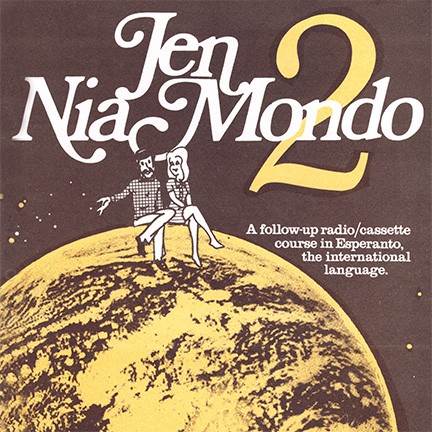
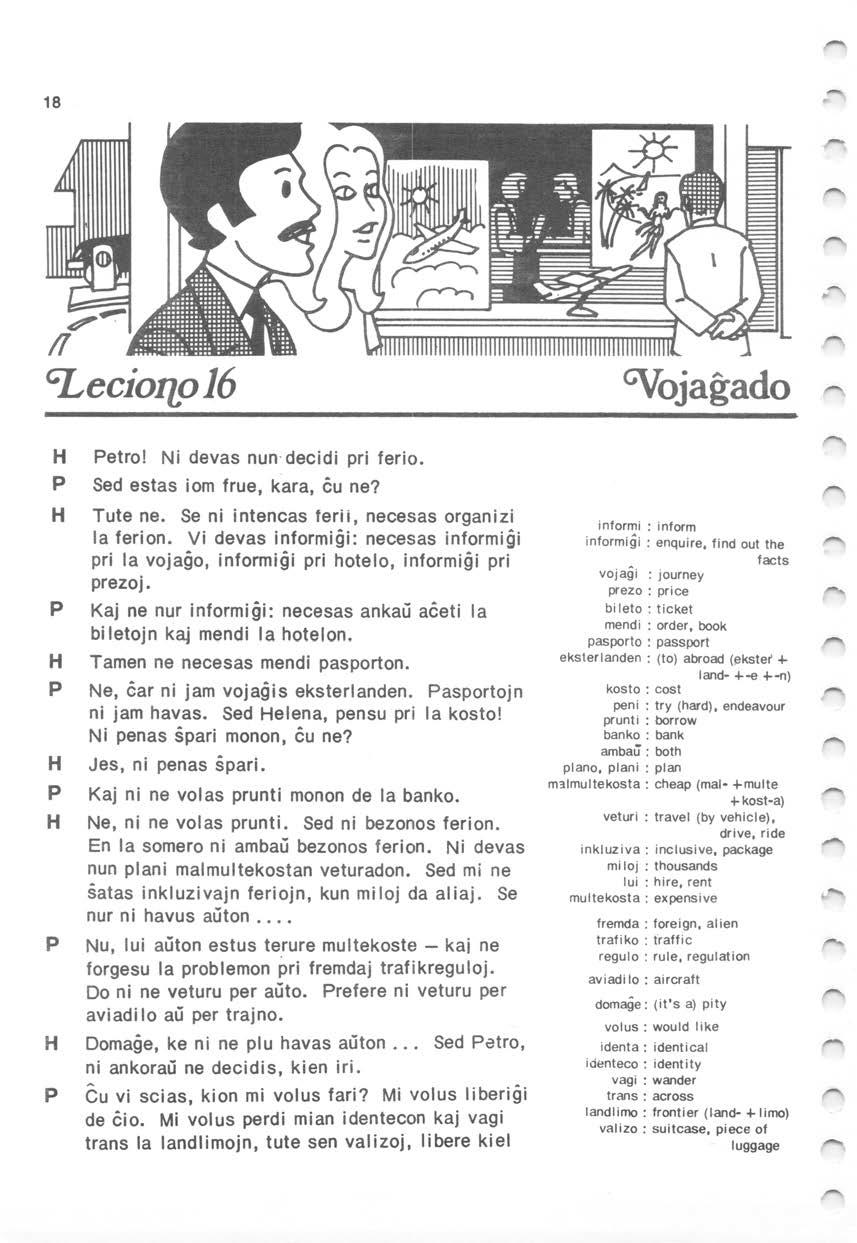
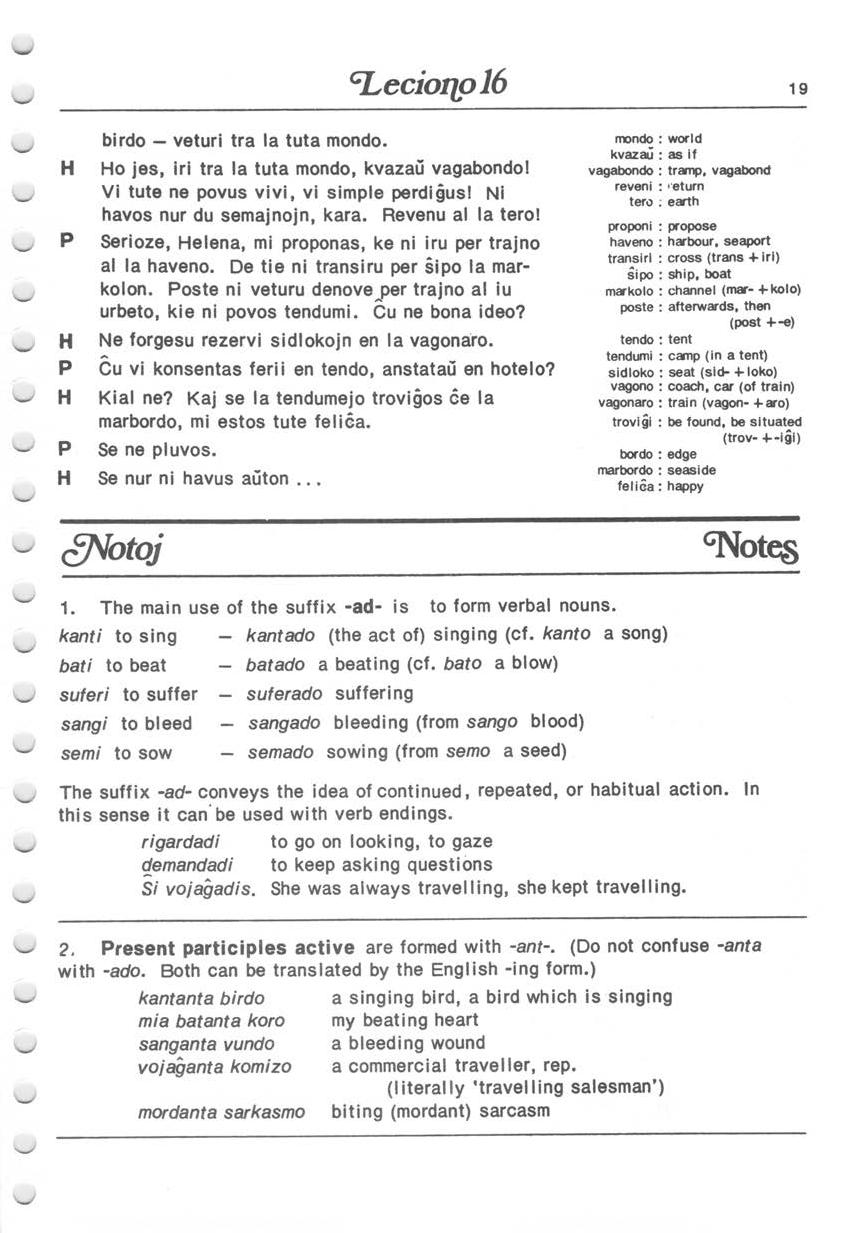
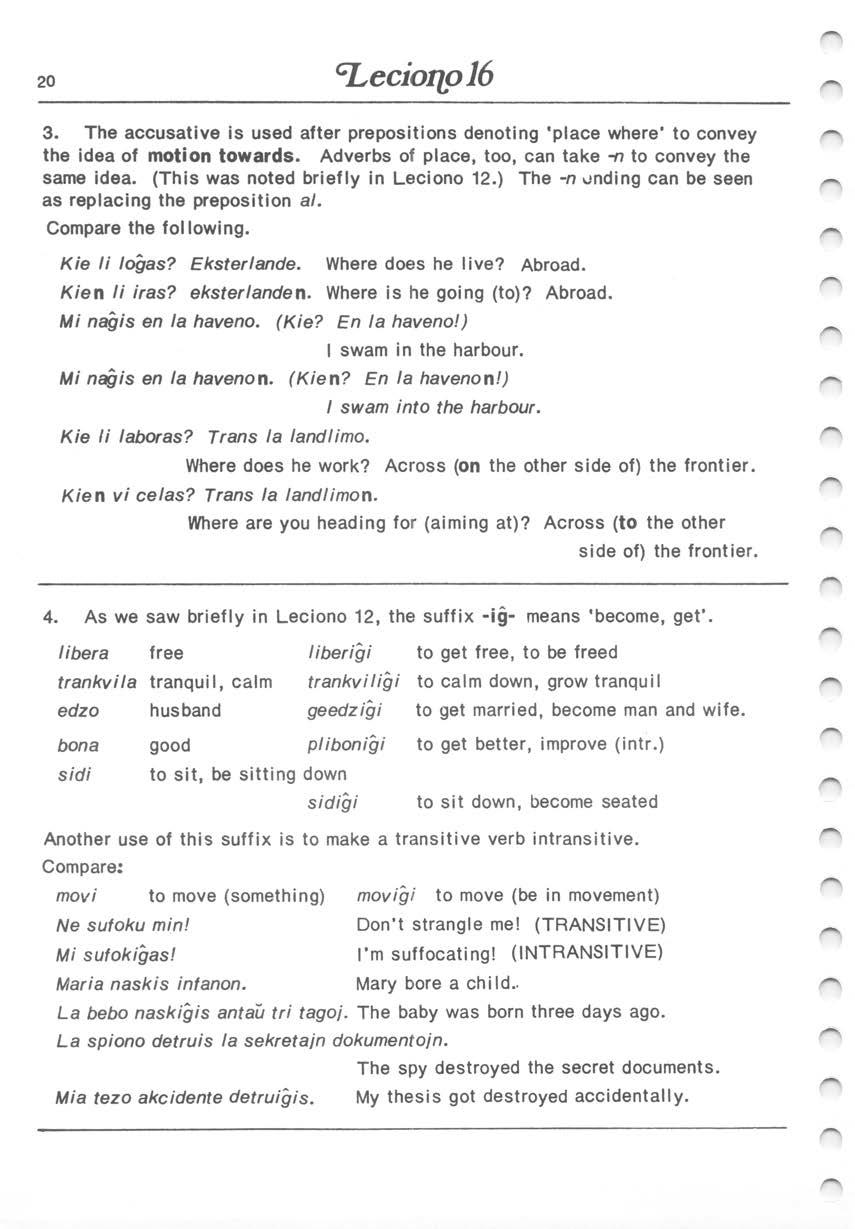
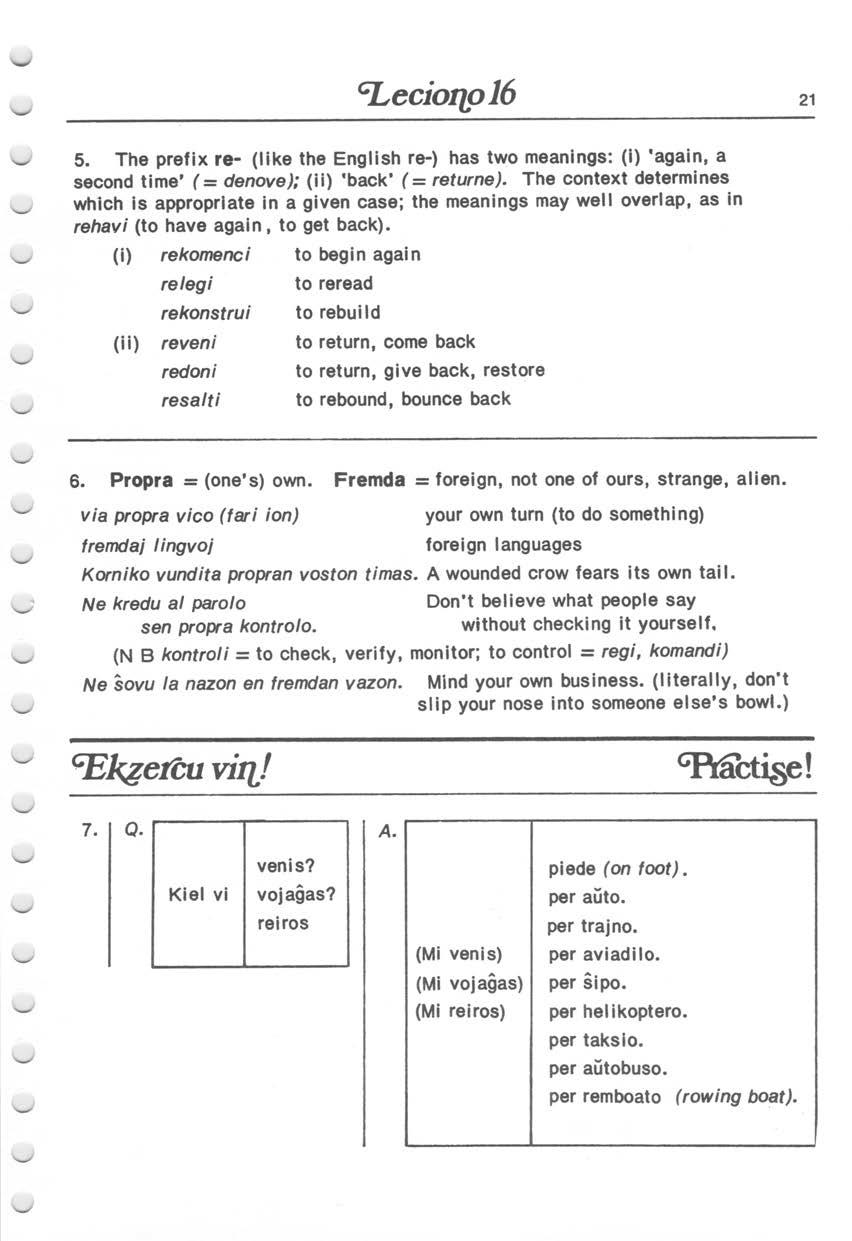
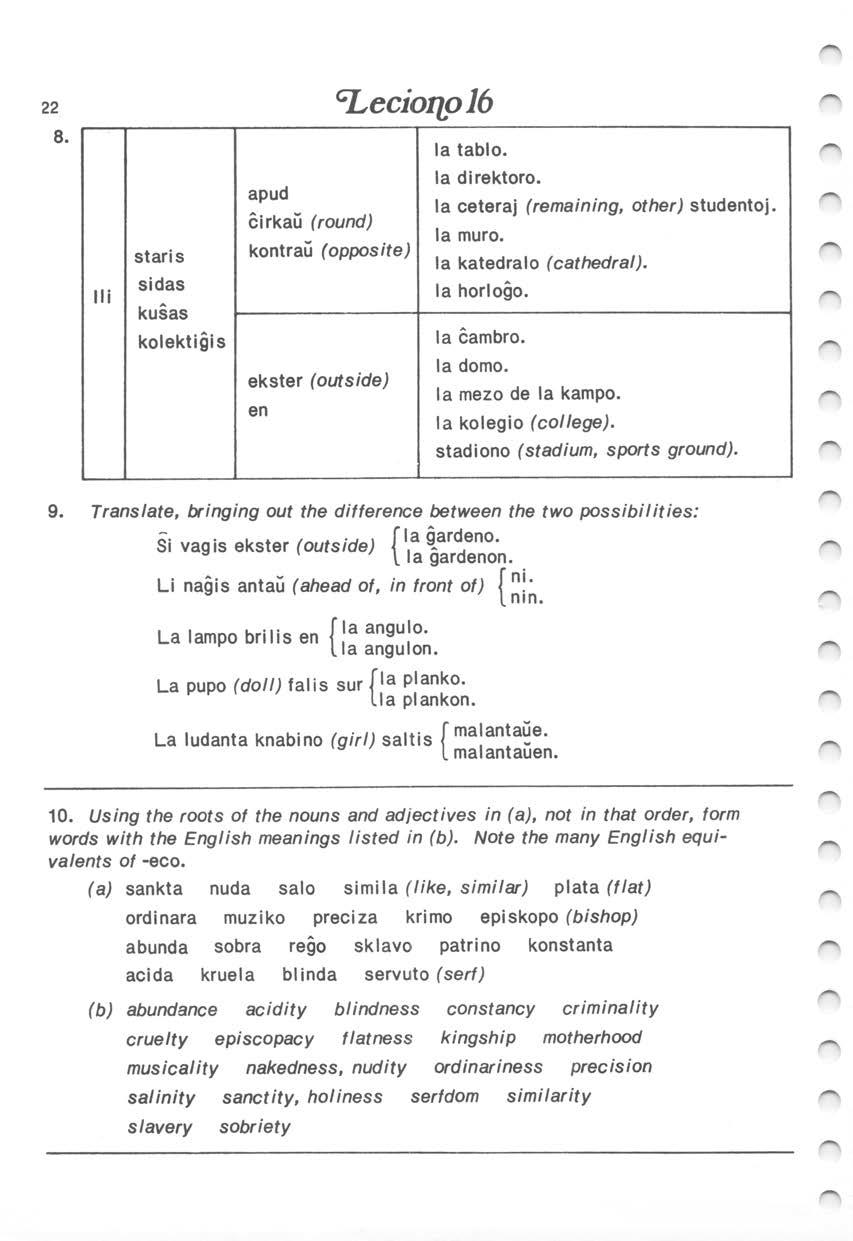
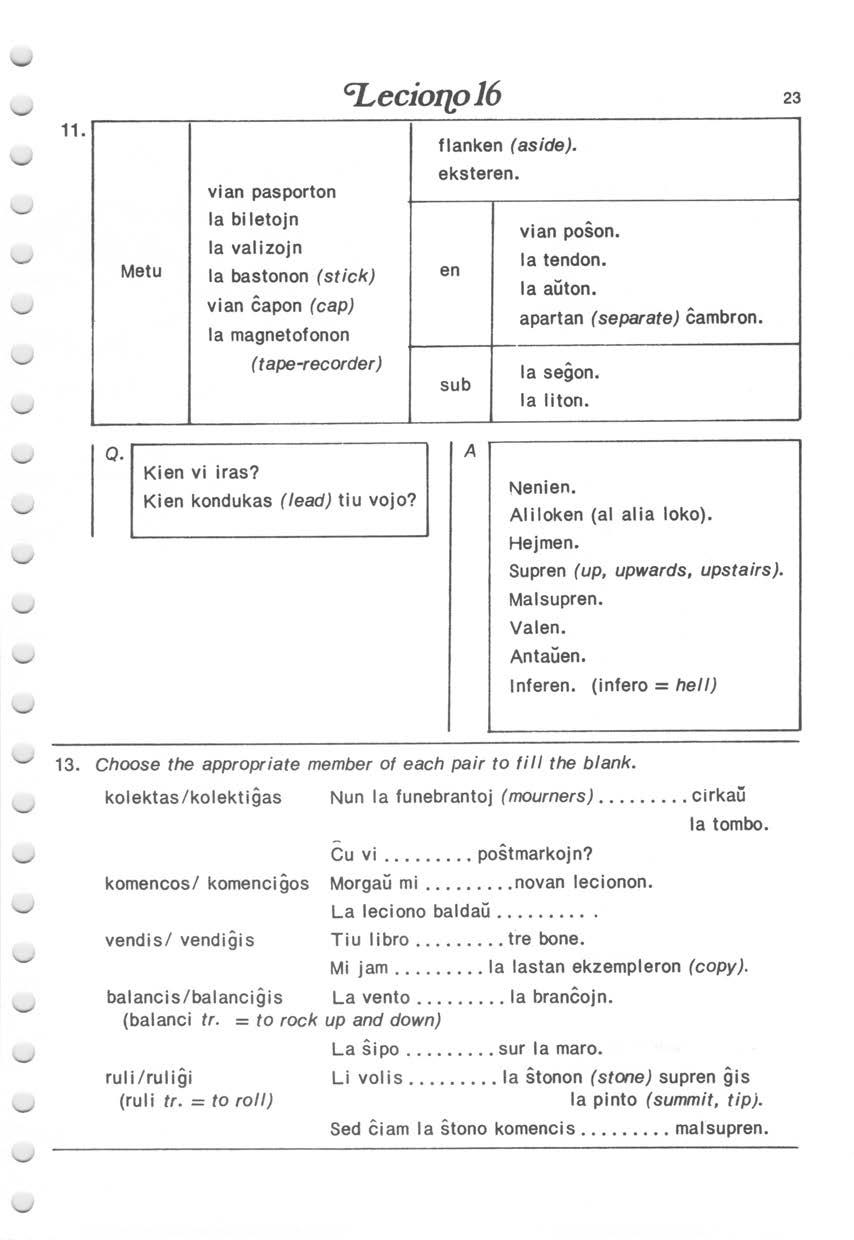
Section 14. Traduku
Helen (Helena): Here is a new letter from my cousin Josephine (Jozefina), She wishes to visit us in the autumn.
Peter (Petro): Read it aloud to me, please.
Helen: Certainly. She writes – “Dear Lena”. She has always called (nomas) me ‘Lena’.
Peter: I remember that. When she was very young, she could not say ‘Helena’. It was too long. Yet Jozefina is an even longer name. Read out loud more.
Helen: She simply says “I want to visit you both. I have a family problem which I need (devas) to discuss with you. I do not have a car now so I will come by train early in the morning and go back in the evening. either Saturday or Sunday. I will only need a cheap one-day ticket.
Peter: I would prefer a Sunday.
Helen: I do not know what sort the family problem could be. Why does she need to travel? Why not just use the telephone?

Answers are offered below
As previously you are recommended to commit as much to writing as possible. Of course what follows are only example answers, with the partial exception of the translation piece. If in doubt consult a live speaker via EAB or the app Amikumu.
Please attempt the above exercises before consulting the material below.
Lesson 16 Sample Answers
Section 7.
Kiel vi venis? Mi venis piede. Kiel vi vojaĝis? Mi vojaĝis per ŝipo. Kiel vi re-iros? Mi re-iros per aŭto.
How did you come? I came on foot. How did you journey? I journeyed by ship. How will you return? I shall return by car.
Kiel vi venis? Mi venis per trajno. Kiel vi re-iros? Mi re-iros per helikoptero.
How did you come? I came by train. How will you return? I shall return by helicopter.
Kiel vi vojaĝis? Mi venis per buso. Kiel vi re-iros? Mi re-iros per taksio.
How did you travel? I came on a bus. How will you return? I shall return by taxi.
Kiel vi vojaĝis? Mi venis per remboato. Kie vi re-iros? Mi re-iros piede.
How did you travel? I came by rowing boat. How will you return? I shall return by car .
Section 8.
Ili staras apud la tablo. They stand near/by the table.
Ili sidas ĉirkaŭ la direktoro. They sit around the director.
Ili sidas kontraŭ la muro. They sit opposite the wall.
Ili sidas ekster la katedralo. They sit outside the cathedral.
Ili kuŝas en la mezo de la kampo. They recline / are lying in the middle of the field.
Ili kuŝas apud la ceteraj studentoj. They are lying near the rest of the students.
Ili kolektiĝis ĉirkaŭ la horloĝo. They gathered around the clock.
Ili kolektiĝis ekster la kolegio. They collected outside the college.
Section 9.
Ŝi vagis ekster la ĝardeno. She wandered around (on the) outside (of) the garden.
Ŝi vagis ekster la ĝardenon. She wandered into (the) outside (of) the garden.
Li naĝis antaŭ ni. He swam ahead of us.
Li naĝis antaŭ nin. He swam (on) to get in front of us.
La lampo brilis en la angulo. The lamp shone in the corner.
La lampo brilis en la angulon. The lamp shone into the corner.
La pupo falis sur la planko. The doll fell forward / back on the floor. (or similar)
La pupo falis sur la plankon. The doll fell down on to the floor
La ludanta knabino saltis malantaŭe. The girl who was playing jumped back a bit.
La ludanta knabino saltis malantaŭen. The girl who was playing jumped right backwards.
Section 10.
abunda – abundant; abundeco – abundance
acida – acid; acideco – acidity
blinda – blind; blindeco – blindness
episkopo – bishop; episkopeco – episcopacy
konstanta – constant; konstanteco – constancy
krimo – crime; krimeco – criminality
kruela – cruel; krueleco – cruelty
muziko – music; muzikeco – musicality
nuda – nude, naked; nudeco – nudity, nakedness
ordinara – ordinary; ordinareco – ordinariness
patrino – mother; patrineco – motherhood
plata – flat, level; plateco – flatness
preciza – precise; precizeco – precision, preciseness
reĝo – king; regeco – kingship
salo – salt; saleco – saltiness, salinity
sankta – holy, sacred; sankteco – holiness, sanctity
servuto – serf; servuteco – serfdom
sklavo – slave; sklaveco – slavery
simila – similar; simileco – similarity
sobra – sober; sobreco – sobriety
English equivalents of ‘eco‘ – acy, ance, dom, ery, hood, (i)ness, ion, ship, (i)ty, (e)ty
Section 11.
Metu vian pasporton flanken – Put your passport aside / to the side.
Metu la biletojn flanken – Put the tickets aside / to the side.
Metu la valizojn eksteren – Put the cases outside.
Metu la bastonon en la aŭton – Put the stick into the car.
Metu vian ĉapon an vian poŝon – Put your cap into your pocket
Metu la magnetofonon sub la liton – Put the tape recorder under the bed
Metu la valizojn en la tendon – Put the cases into the tent.
Metu la magnetofonon en apartan ĉambron – Put the tape recorder into a separate room
Section 12.
Kien vi iras? Nenien. Mi iras nenien. – Where are you going to? Nowhere. I am not going anywhere.
Kien vi iras? Aliloken. Mi iras al alia loko. – Where are you going to? Another place. I am going to another place.
Kien vi iras? Hejmen. Mi iras hejmen. – Where are you going? Home. I am homeward bound.
Kien kondukas tiu vojo? Supren. Ĝi kondukas supren. – Where does that way lead to? Up. It leads up(wards).
Kien kondukas tiu vojo? Malsupren. Ĝi kondukas vin malsupren. – Where does that way lead? Down(wards). It takes you down(wards).
Kien vi iras? Valen, Mi iras en valon. – Where are you going (to)? Towards a valley. I am going into a valley.
Kien kondukas vin tiu vojo? Antauen, eble inferen! Jes, ĝi kondukas vin antauen, eble en la infernon! – Where does that way take you? Fowards, maybe into hell. Yes, it takes you onwards, maybe into hell.
Section 13.
Nun la funebrantoj kolektiĝas ĉirkaŭ la tombo. – Now the mourners collect around the tomb.
Ĉu vi kolektas poŝtmarkojn? – Do you collect postage stamps?
Morgaŭ mi komencos novan lecionon – Tomorrow I start a new lesson.
La leciono komeniĝos baldaŭ – The lesson will begin soon.
Tiu libro vendiĝis tre bone – That book sold /has sold very well.
Mi jam vendis la lastan ekzempleron – I have already sold the last copy
La vento balancis la branĉojn – The wind rocks the branches
La ŝipo balanciĝis sur la maro –The ship rocks on the sea.
Li volis ruli la ŝtonon supren ĝis la pinto – He wanted to roll the stone upwards.
Sed ĉiam la ŝtono komencis ruliĝi malsupren. – But the stone always started to roll downwards
Section 14.
Helena: Jen nova letero de mia kuzino Jozefina. Ŝi deziras vizit nn en la aŭtuno.
Petro: Legu ĝin laŭte (aŭ laŭtlegu ĝin) al mi, mi petas.
Helena: Certe. Ŝi skribas – “Kara Lena”. Ŝi ĉiam nomas min ‘Lena'”
Petro: Mi memoras tion. Kiam ŝi estis tre juna, ŝi ne povis diri ‘Helena’. Ĝi estis tro longa. Tamen Jozefina estas eĉ pli longa nomo. Legu laŭte (laŭtlegu) pli!
Helena: Ŝi diras simple: “Mi deziras vizit vin ambaŭ. Mi havas familian problemon kiun mi mi devas diskuti kun vi. Mi ne havas (posedas) aŭton nun, do mi venos (veturos) per trajno frue en la mateno kja reiri en la vespero, aŭ je sabato aŭ dimanĉo. Mi bezonos nur malaltkostan unutagan bitleton”
Petro: Mi preferus [iun] dimanĉon.
Helena: Mi ne scias, kia la familia problemo povas esti. Kial ŝi devas (devos) vojaĝi? Kial ne simple uzi la telefonon?
Lesson 16 : Vocabulary for this lesson
-ado
Akcidento
Ambaŭ
-ant/a
Apart/a
Aviad/o; ~/il/o
Balanc/i tr
Bank/o
Baston/o
Bilet/o
Boat/o
Bord/o
Celi
Ceter/a
Ĉap/o
Ĉirkaŭ
De/nov/e
Detrui; ~/o
Dokumento
Domaĝ/e
Ekster
Ekster/land/en
Episkop/o
Feliĉ/a
Fremd/a
Funebr/i
Haven/o
Ident/a; ~/o
Infer/o
Inform/i; ~/o
Inform/iĝ/i
Inkluziv/a
Kant/ad/o
Katedral/o
Knab/in/o
Kolegio
Komandi
Konduk/i
Kondut/i
Kontraŭ
Kontrol/i
Kornik/o
Kost/o
Kvazaŭ
Land/o
Land/lim/o
Liber/a; ~/o
Lim/o
Lu/i
Lu/ig/i
Magnetofono
Magnetoskopo
Mar/kol/o
Mend/i
Mil/o
Mond/o
Mord/i
Mov/i
Mov/iĝ/i
Mult/e/kost/a
Nask/i
Nask/iĝ/i
Pasport/o
Pen/i
Pied/o
Plan/o, ~/i
Plat/a
Post/e
Prez/o
Propon/i; ~/o
Propr/a
Prunt/i
Pup/o
Re/
Reg/i
Reg/ist/ar/o
Regul/o
Re/leg/i
Rem/i
Re/ven/i
Rul/i tr
Sang/o; sang/i
Sarkasm/o, ~/a
Sekret/o, ~/a
Sem/o; ~/i
Servuto
Sid/lok/o
Simil/a
Stadion/o
Sufoki (tr)
Sufer/i
Supr/e; ~/n
Supr/o
Ŝip/o
Ŝov/i
Ŝton/o
Tend/o
Tend/um/i
Ter/o
Tezo
Tim/i
Trafik/o
Trankvila; ~/o
Trans
Trans/ir/i
Trov/iĝ/i
Vag/i
Vagabond/o
Vagon/ar/o
Valiz/o
Vetur/i
Vic/o
Vojaĝ/i
Vojaĝ/ant/a
Vol/us
Vost/o
Vund/i
Act of (verbal noun)
Accident
Both cf ambidextrous
-ing
Apart; separate
Aviation; Aircraft, plane
Rock to and fro, swing
Bank
Stick; baton
Ticket
Boat
Edge, border
Aim at, target
Remaining
(Brimless) cap
(A)round, about
Again, afresh
Destroy; destruction
Document
(It’s a) pity
Outside; besides
(Towards) abroad
Bishop, overseer
Happy cf felicitous
Foreign, alien
Mourn
Harbour, seaport
Identical; identity
Hell; infernum
Inform; information
Enquire, find out facts
Inclusive, ‘all-included’
(Act of) singing
Cathedral
Girl
College
Be in command of
Lead; drive(car)
Behave (good or bad)
Against; opposite
Check, supervise
Crow (bird)
Cost
As if, as though, quasi-
Country, land
Frontier
Free; liberty
Limit
Hire, rent from
Hire (s/thing) to, rent to
Tape recorder
Video recorder
Channel (neck of sea)
Order, book (repair!)
A thousand
World
Bite cf mordant
To move something
To get moved
Expensive
Give birth to, bear (tr)
Be born cf nascent
Passport
Try (hard), endeavour
Foot cf pedicure
Plan
Flat, levl
Afterwards, then
Price
Propose; proposal
(One’s) own
Borrow, lend to
Doll; puppet
Again, a second time
Rule, govern, reign
Government
Rule, regulation
To reread
Row (boat)
Return
(make) roll
Blood; bleed (ntr)
Sarkasm, sarcastic
Secret, secret
Seed; sow (seed)
Serf
Seat
Similar
Stadium
Suffocate, choke
Suffer
Up top; upwards
Top, summit
Ship, boat
Shove, shift (tr)
Stone
Tent
Camp in a tent
Earth cf terrestrial;
Thesis
Fear cf timid
Traffic
Calm; tranquility
Across cf transmit
Cross
Be found, be situated
Wander
Tramp, vagabond
Train
Suitcase
Travel, drive
Role, line, turn cf vice-
Travel, journey
Travelling
be conditionally willing
Tail
Wound